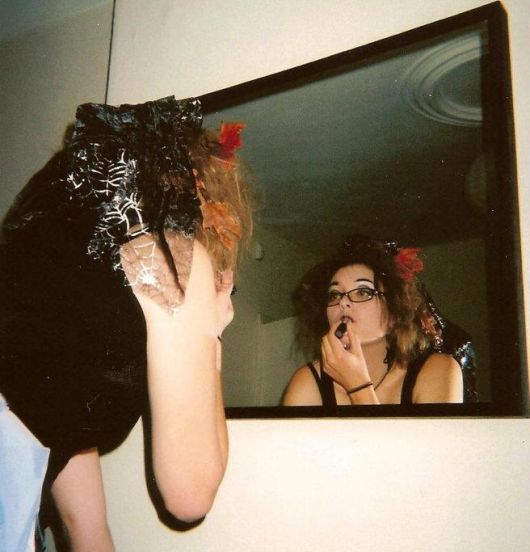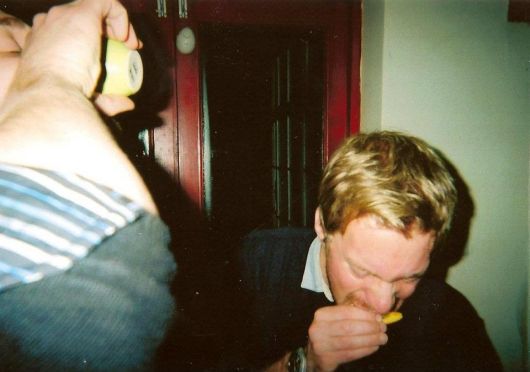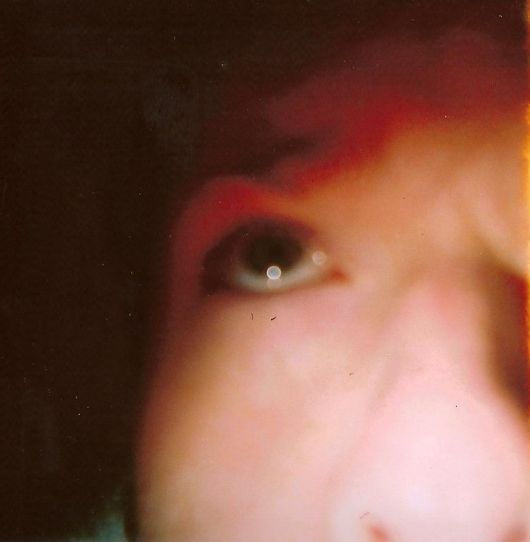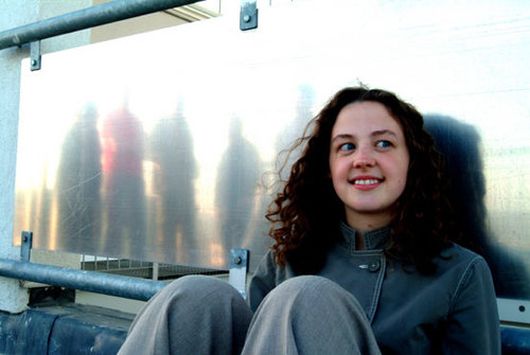 THE WORLD
THE WORLD « In Which We Read The Remarks Of Housewives »
 Thursday, December 27, 2012 at 10:02AM
Thursday, December 27, 2012 at 10:02AM 
Vicariously
by RACHEL SYKES
This time last year, I was recovering from a stay in the hospital by reading The Feminine Mystique. I had found an old copy among several novels on the floor of my grandma’s spare room; it was mine, I guessed, dropped sometime in between shifting old texts to book sales. That winter, I had taken leave from work and was reading anarchically, giving my attention to books I’d never had time for and to others I did not even think I should read. Friedan was one of the former, and I read the remarks of housewives, quietly and oddly, as my grandma fussed and tidied her kitchen:
But what can I do, alone in the house… It is easier to live through someone else than to become complete yourself.
The noise in the kitchen was always accompanied by a choir on the radio, a relic of a machine held together by tape, which had survived the 1950s with my grandma. Removed from where I lived my life as I chose, it proved difficult to sit amongst books I had never opened, reading things I might never have read. And though I questioned Friedan’s idea of completeness, I thought about the slope to living vicariously, as I tried not to think about the lives my friends continued without me. Vicariousness appeared to be a sense of wonder, formed in the gap between expectation and reality, something which might be mistaken for self-helplessness. Friedan saw it as a fear of possibility. As she rattled her pots and pans, as she was happy I was home no matter what the circumstances, I wondered if my grandma had ever lived vicariously herself.
That winter, if I felt sad about where I was or what had brought me there, I read the bits of poetry I had copied into notebooks as a teenager. My grandma didn’t approve, telling me that poetry only led to dark thoughts. She offered me ginger wine and documentaries about pregnant teenagers in its place. But after taking the wine, and leaving it by the side of my bed, I would read lines from Frank O’Hara, the ones which seemed like a tonic to the vicarious, though they read equally like a mantra or the blurb of a tumblr:
Grace / to be born and live as variously as possible.
I knew that “Grace,” standing alone on the line, referred to O’Hara’s friend, the artist, Grace Hartigan. That line is suspended between descriptions of Hartigan’s paintings and, for all its quotability, makes an uneasy link between the dynamics of their friendship and O’Hara’s poetic effect. Teetering over the sentiment of the phrase that follows, “Grace” is universal, a symbol of all relationships. Both singular and infinite, it is not just O’Hara’s desire, but hers, theirs and ours, which lives to experience as variously as we are allowed.

If friendship is a vow of constancy, then the relationship between O’Hara and Hartigan is harder to grasp alongside the wish to live in variety. But if this is a complicated way of talking about relationships, it isn’t a mournful one. For O’Hara, part of his identity is formed in his companionships; identity is reciprocal, dynamic, and creative.
I am writing, then, about friendship, but also about a word.
This past November, five of my closest friends casually mentioned a wish to live, vicariously, through me. In text and in letter form, then in person or on the phone, these friends reiterated their love of living and experiencing my day to days, vicariously. These five friends, all of them in long term relationships, engaged, or already married, had begun to tell me how they loved to experience my second-handed drama. But they didn’t just say it once; they said it over and again.
I am writing, here, under a series of disclaimers which would stress that my life is neither particularly interesting nor that my friends show an abnormal level of interest in it. Friendships, I know, do not occur simply to keep us close to those who mirror our behaviour, or even to show us that the most personal of anxieties are not ever solely our own. There must be some extent to which we are all living vicariously through the people we know, getting thrills from the problems that aren’t quite ours, but which we can hear fully expressed and close-up, making mental notes to never have the misfortune of enduring similar.
But to be born and live as vicariously as possible. Once it had been said out loud, it began to litter the responses to my stories, the word passed between friends like a note dropped in class.
This morning, from between two books, a letter fell out, written by a friend living overseas. “Any new drama?” she asked, in bright green ink, “You know I just LOVE to live vicariously through you.”
And, there again, written last January, a friend was living vicariously. An old friend, we had met at the after show party for a Mount Holyoke production of The Vagina Monologues, where we’d spoken about Macbeth over genitalia shaped chocolates. My friend, who we had Skype-counselled through a disastrous spell on Craigslist, where time and again she had met “the worst guy in the world,” and where, time and again, she had returned to his insults and a second date. She, now settled and suburban, who was animatedly, hopelessly, in love, three years into her relationship, was nostalgic for a time when all she had wanted was what she now had.

The vicarious seemed to shift my friends between what they wanted and what they had, before pausing on what they had once wanted. There was no malice in the sentiment, but the casual frequency with which they said it seemed striking. The word was sort of beautiful: half vicodin, half effusion. If you look at it too long, which I, in bright green, found myself doing as I dried my hair, it appears like a cross between vicar and riot: an impulse both puritanical and anarchistic.
But its connotations seem knotted. Whenever someone now says it, I see the funnel between my lifestyle and theirs expanding with each syllable, our friendship a kaleidoscope which is hypnotic from only their end. To live vicariously is to experience an emotion at a distance from the subject. It is, perhaps, empathetic, if always delegated or surrogated. It implies shock and comfort in as equal measure as gratification. Vicarious means to substitute, to have a rare, out of body experience, endured or suffered by one person so that another won’t have to. The authority is with the observer, not the subject, of course, so while they mean, I am sure, to convey how they are experiencing, imaginatively, the feelings or events of another life, the observer comes into the possession of knowledge for which the penance is reckoned by the subject alone.
In law, it means the responsibility of a superior for the subordinate.
As a power dynamic, it’s pretty dire.

A fairer preface, and one not given here, might have outlined my larger habit of storytelling. I offer information, on myself, at a rapidly increasing rate. In writing this now, in fact, I am inviting vicariousness, yet the compulsion to make stories out of the present only increases. I apologise, to friends about this, not knowing when I am abusing an ear too often.
“But that’s OK,” they say back, “You know we LOVE to live vicariously through you.”
I remember one winter my mum had had a particularly bad break-up. Her cassette tape of Jagged Little Pill never left our car. We drove round and round the countryside, listening to that album, until the following summer when she became embarrassed by the obvious wear on the tape and threw it away. My favourite song, I remember, seemed to me to be the happiest. Alanis sarcastically lists all the ways in which she doesn’t want to fix her lover, stating the impossibility of helping someone who refused to analyse themselves: “I don’t want to be lived through, a vicarious occasion, please.” I remember the word sticking out like a barb, half vicodin, half vicar, half riot. Far too long, and far too jagged, because, I suppose, it is easier to live through someone else than to become complete yourself.
Rachel Sykes is the senior contributor to This Recording. You can find an archive of her writing on This Recording here. She tumbls here and twitters here. She last wrote in these pages about her fear of flying.

"Cordelia" - Jo Mango (mp3)
"Every Certainty" - Jo Mango (mp3)

 frank o'hara,
frank o'hara,  grace hartigan,
grace hartigan,  rachel sykes
rachel sykes 





























Reader Comments (1)